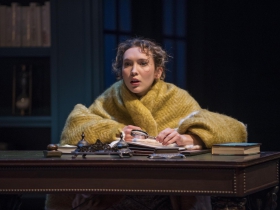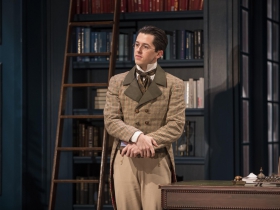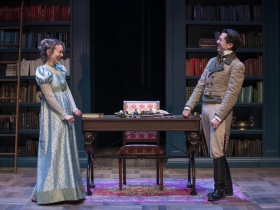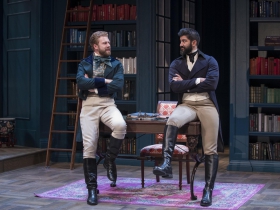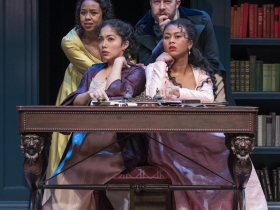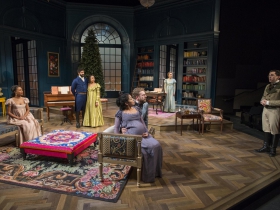The Return of Jane Austen
Rep’s new play updates Austen’s characters, but with far too much cuteness and cavorting.
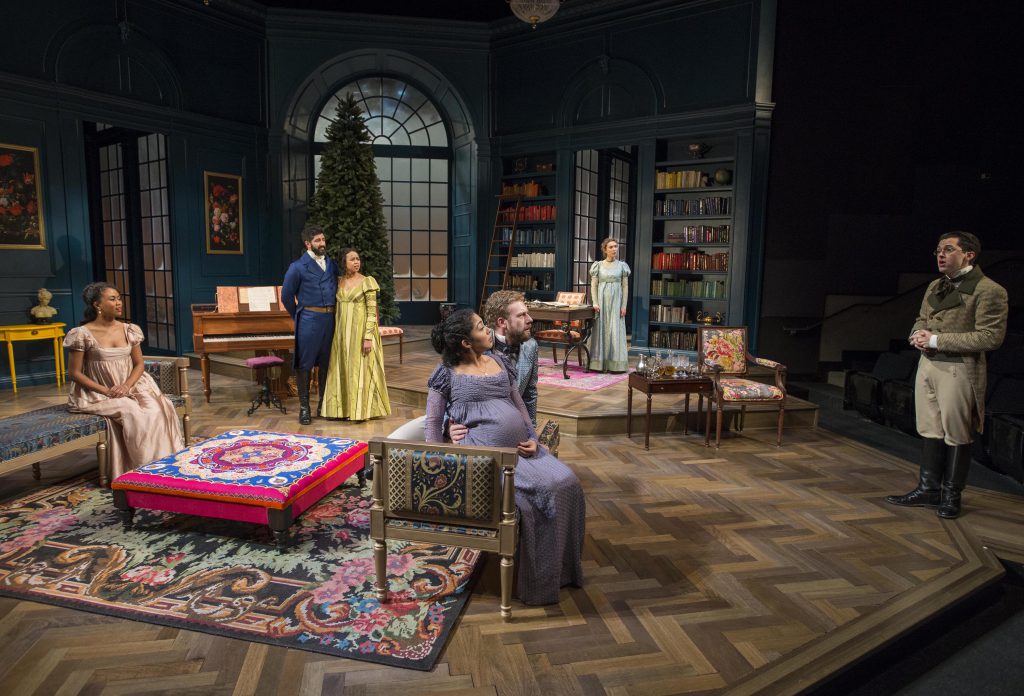
Milwaukee Repertory Theater presents Miss Bennet: Christmas at Pemberley in the Quadracci Powerhouse from November 13 – December 16, 2018. Photo by Michael Brosilow.
Seeking to charm us with country manor manners from 18th century Britain, a cast largely new to Milwaukee Rep patrons offers broad expressions and mime interplay along with flashes of witty dialogue. They curtsy and dance in unison, pose in elegant period costumes, coordinate book droppings in piques of anger and dash hither and yon around a gorgeous stage — and it is a gorgeous stage by scenic designer Courtney O’Neill, which emerges as the real star of Miss Bennet: Christmas at Pemberley on the Powerhouse main stage through December 16.
Under elegant chandeliers and with a living area leading into a library and many convenient entrances for what soon turns into farce, the new play by regional theater’s busiest new playwright, the often admirable Lauren Gunderson, abetted by Margot Melcon, attempts several things all at once.
First, to revisit two years later the family of sisters and romance made famous in Jane Austen’s novel Pride and Prejudice — the lovely Darcys, the happy Bingleys, the violently flirtatious Lydia and the emerging middle sister Mary, who seems doomed to a spinster life at the spinet unless a rich man comes along as enamored of music, books and learning as she is. And sure enough, here he is, a Darcy cousin as shy, bespectacled and acrobatic as silent screen star Harold Lloyd, with a vocabulary to match. He is so unschooled in the ways of love that his first encounter sends him into a paroxysm of arousal inside period costuming.
Can two modern writers find a believable place, a time warp these people can inhabit somewhere between the 18th century and now, using the characters, limitations and controls of one generation to comment on and invigorate ours?
Well, the play sure tries. After awhile, it tries way too hard. And while it seems presumptuous for an observer to go against the two noted authors and a director collaborator, Kimberly Senior, with many Broadway and new play credentials, they missed many possibilities and some basic trust of audiences that less gaudy acting and more delicate interplay would have allowed.
Perhaps they were seduced by the technical skills on hand at the Rep, including Noele Stollmack’s subtle warm lighting and costume designer’ Mieka van de Ploeg’s variations on the Empire silhouette (so helpful in a play featuring a pregnant woman). Perhaps they thought the cast personable enough to lean on making happy faces, knowing snickers and giddy behavior. Whatever the perhaps, they didn’t disguise that the audience is being talked down to while very often it didn’t need that extra oomph to catch the zingers, the bon mots I mainly credit to Gunderson.
The elegant and pointed discourse that should best tell this story and that Austen would have most admired disintegrates often. The production doesn’t seem sure the Rep audiences will pick up on the humor unless it is highlighted in yellow marker, even down to spit takes and carafe guzzling. It tries out one section of revelations through repartee, then inserts a Keystone Kops sequence, then a fit of comic temperament.
There is room for high comedy in Austen’s world – anyone who has enjoyed such period plays as The Rivals knows such possibilities abound, even to the curling of bodies into fits of agony. There is always room in theater for sweet and sappy. But bouncing among extremes to fill pauses puts excess reliance on actors resorting to what their agents would call “selling” their stage appeal. The production seems to hope we like them enough to forgive some personality trickery.
Victimized by this style over genuine sisterly affection are Margaret Ivey and Sarai Rodriguez, whom I suspect have deeper talent. Faring better are the men in their lives, Yousof Sultani and Fred Geyer, who nevertheless spend too much time striking manly costume poses.
In Austen’s novels, the liveliest characters are often the most obviously intrusive and dislikable, so Deanna Myers’ mid-show arrival is a welcome breath of the rude old Lady de Bourgh come back to life in full acidity (Myers plays her demanding daughter). As Lydia, Netta Walker never quite finds a balance between the character’s annoying winsomeness and her own.
In the second act Jordan Brodess finds a more believable variation of dumbstruck suitor than he cavorted into attention in the first act. In both acts, there is much that’s appealing about Rebecca Hurd as Mary, the sister with a sharp tongue and a genuine complaint about being taken for granted by her family. But she often pounced too directly in dialogue comebacks when inner fury and finesse would have been more suitable to both the language and her character. Again, that seemed the show’s stylistic choice.
A lot of the mime portions and the hasty running about come across as padding – not a meaningful flourish but an effort to make amends for what is missing in the characters and dialogue.
Miss Bennet: Christmas at Pemberley Gallery
Dominique Paul Noth served for decades as film and drama critic, later senior editor for features at the Milwaukee Journal. You can find his blog here and here.
Review
-
Eating Burmese in Bay View
 Dec 13th, 2025 by Cari Taylor-Carlson
Dec 13th, 2025 by Cari Taylor-Carlson
-
Casablanca Is a Milwaukee Success
 Nov 30th, 2025 by Cari Taylor-Carlson
Nov 30th, 2025 by Cari Taylor-Carlson
-
Oh, Those Witty 18th Century Brits
 Nov 24th, 2025 by Dominique Paul Noth
Nov 24th, 2025 by Dominique Paul Noth
Theater
-
Oh, Those Witty 18th Century Brits
 Nov 24th, 2025 by Dominique Paul Noth
Nov 24th, 2025 by Dominique Paul Noth
-
Skylight’s Holiday Show Is Lots of Fun
 Nov 16th, 2025 by Dominique Paul Noth
Nov 16th, 2025 by Dominique Paul Noth
-
Rep’s ‘Come From Away’ Is a Triumph
 Nov 10th, 2025 by Dominique Paul Noth
Nov 10th, 2025 by Dominique Paul Noth

